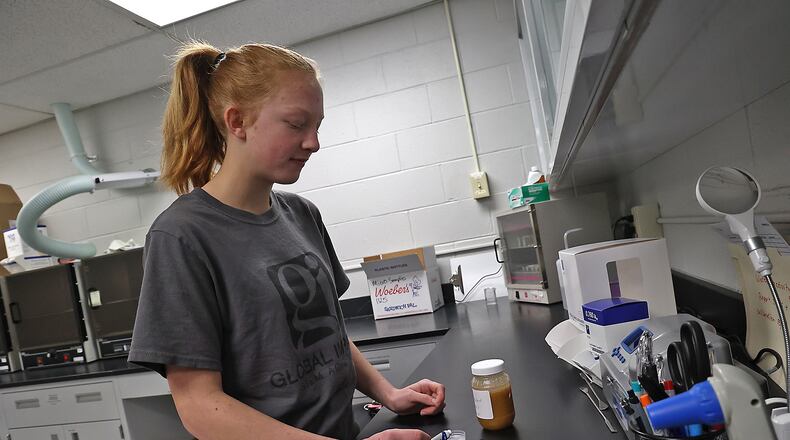Tessa Holcomb started in June at Woeber Mustard working 20-hour weeks through September, when she worked nine-hour weeks during the school year.
“It was a new environment for me. The factory floor was loud and busy, which is something I had to adapt to,” Holcomb said. “I also had to take my own initiative sometimes. If I couldn’t find someone on one of the lines or had questions about paperwork, I would just have to ask someone on that line even if I didn’t know them, which was new to me.”
During her time at Woeber, Holcomb updated standard operating procedures (SOPs), created sanitary SOPs, contacted suppliers, did some filing, helped with monthly sanitation audits and ran water activity tests in the lab.
Holcomb said she feels more prepared to be on her own having experience from her capstone.
“Through the internship, I learned a lot about the industry and it opened my eyes to several careers I could pursue. This was also my first job so I feel overall more prepared to go into a professional setting,” she said.
“I think I improved upon my professionalism, which is one of the goals I outlined before I started working at Woeber’s. This is my first time doing work outside of schoolwork so, it was really important that I figured out how to conduct myself in the professional setting.”
Cathy Holcomb, Tessa’s mom, said she felt the capstone was an “outstanding” experience for her because it gave her real responsibilities, increased her confidence and gave her good experience for future job interviews.
“(It) was great because not only was she exposed to the food manufacturing industry and the variety of jobs involving in it, but she had to do things like fill our personnel forms, open a checking account to get her paycheck auto-deposited and make sure there was enough gas in the tank to get to work,” she said. “She had to manage her time well between her class-load, working and running cross county.”
Cathy Holcomb added that without the help of Tessa’s teacher, Rachel Sanders, and the GISA capstone, she wouldn’t have had the opportunity to have her first job and get the experience.
Sanders said she helped assisted Tessa in getting in contact with Janelle Rinehart at Woeber. She said Tessa wanted an internship that blended her passion for science and English, so she contacted Woeber to see if they needed and intern in their quality assurance department.
“By working with the students to help them find meaningful capstone experiences, allows them the opportunity to explore a more in-depth look into career fields and decided if that is a path they would like to pursue after graduation,” she said. “Students are able to demonstrate their skill sets, and receive positive and constructive feedback that will help them build their confidence within the next phase of their futures.”
Rinehart, a food safety coordinator at Woeber, said she feels it’s important for students to see how businesses operate, how many departments meet to get the work accomplished, and actually seeing someone work in the field you may pursue a degree in.
“What happens if that is not actually what you want to do and now after four years of college or more you have now found that out? College is expensive and is also where you go to learn about a field in which you hopefully will be happy and will want to spend the rest of your life doing,” Rinehart said. “Being able to offer the students this experience before they go to college allows them to see what their job might look like, it is easier to change careers before you go then after you have already completed for some majors.”
As for next steps, Sanders said she will mentor Tessa as she gives her capstone project presentation to a group of juniors and the other capstones advisors, as well as verify if her hours qualify her for an industry credential. She said that most students complete over 300 hours which can lead to potential industry credentials such as Ohio Ag Business Association Credential and CIFT Food Science Credential.
After high school, Holcomb said she is planning to go to Miami University but is undecided on her major.
As part of the GISA capstone, students are required to complete a minimum of 240 hours in: major independent research, paid or unpaid internship, service learning, work study and entrepreneurship, according to Josh Jennings, GISA Founding Director. Capstones can be in the form of a mentorship employment, cooperative education, apprenticeships and internships.
Jennings said each student has an advisor at the school as well as a mentor associated with the capstone who is not a GISA employee, normally a supervisor at the place of employment or community members with an understanding of the specific capstone experience.
“Students apply program knowledge and skills in a more comprehensive and authentic way. Capstones are project/problem-based learning opportunities that occur both in and away from school. Under supervision of the school and through partnerships, students combine classroom learning with work experience to benefit themselves and others,” he said.
Rinehart said she’s honored to get to know GISA students and have the learning experience.
“They have assisted in many tasks and helped with many work projects. I don’t know if they all know how much this has helped me and the Woeber Company as well,” she said. “I look forward to working with more students who want to work at a food science internship for their senior capstone.”
About the Author

